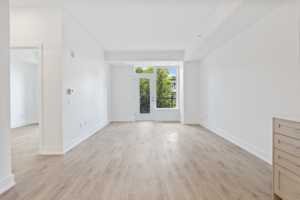A security deposit, also referred to as a “damage deposit,” is a sum of money that a landlord can request on commencement of a tenancy to hold for the purpose of covering the cost of remedying any damage, beyond fair wear and tear, conducted during the life time of the tenancy. Under current legislation, the maximum amount a landlord can lawfully hold is equivalent to 5 weeks of the rental value. It is usually retained for the duration of the tenancy and discharged once a tenant has left the property.
Keep reading this blog to find out what a landlord can and cannot deduct from a deposit.
Rent That Has Not Been Paid At Any time During The Tenancy
To maintain a good working relationship with a landlord, it is expected that a tenant will pay their rent on time and in full. If rent is owed when a tenancy ends then a landlord has the right to claim the shortfall from the security deposit.
If this isn’t enough, they can ask a tenant to make an additional payment directly to cover the shortfall. If this is not forthcoming a money claim filed through the county court money claim centre may be a path a Landlord wishes to follow for recovery purposes. This can result in additional costs and liability and therefore should only be considered as a last resort.
Cleaning Expenses
There are many obligations which befall a tenant under the terms of an assured shorthold tenancy, and returning the property to the same condition in which it was taken is one of them. Landlords have the right to deduct an amount from your deposit if a tenant leaves the property below the standard in which it was taken in terms of cleanliness. A Landlord cannot demand that the property is professionally cleaned but they can demand that it is cleaned to a certain standard, which should be reflected in the move-in inventory report.
A landlord will need to prove their case if they feel the cleanliness of the property returned to them is below the required standard. To this end, it is essential that a robust condition report is sourced on commencement of the tenancy and at the end of the tenancy. This will help support and evidence their views and any corresponding claim. In the first instance, an opportunity for the tenant to return to the property and undertake the required improvements should be offered as there can then be sound justification for advancing a reasonable charge to remedy.
A Demonstrable Depreciation In The Property’s Condition
Aside from situations which clearly fall under fair wear and tear, a Landlord is within their right to claim for damage caused by the tenant’s actions during the tenancy.
However, the condition reports are a very good starting point for negotiation. A Landlord should obtain three quotes for the work to remedy any damage and put their view and evidence to the tenant for their opinion. If agreed, the deposit can be the first port of call for funds towards the agreed cost for remedy. A tenant may wish to source their own quotes and the Landlord should give due consideration to the tenant’s views and quotations sourced. If the issues cannot be narrowed or an agreement reached between the parties with regards the substance of any claim for disrepair then the deposit will offer ADR (Alternative Dispute Resolution) at no extra charge and which should negate the need for formal recovery proceedings by way of the county court money claim centre. ADR will be conducted robustly by the deposit scheme and therefore evidence will almost certainly be required to justify a claim against the deposit. To our mind, a Landlord will be required to demonstrate fully the validity of any claim, as the default position will be that a tenant should be entitled to the full return of their deposit in the absence of a clear and well-presented argument, underpinned by reasonableness and fairness.
Missing Items
Furnishings that are lost or broken may also clear the way for a claim against the deposit unless explicit consent was given during the tenancy.
A landlord has the right to claim from a deposit to cover the cost of missing or broken furniture which was supplied by them on commencement or during the tenancy. It is advisable to take a pragmatic approach when negotiating a claim on this basis especially if the tenancy was long term.
Get In Touch with Landlord Assist
We have a team of landlord and tenant experts who specialise in deposit management, dispute resolution and residential eviction expert. Our rent arrears expert UK and panel of solicitors in Kent can help you to maximise the return on your investment and help develop a stronger relationship with your tenant, especially at times where the relationship may seem somewhat strained or broken.







